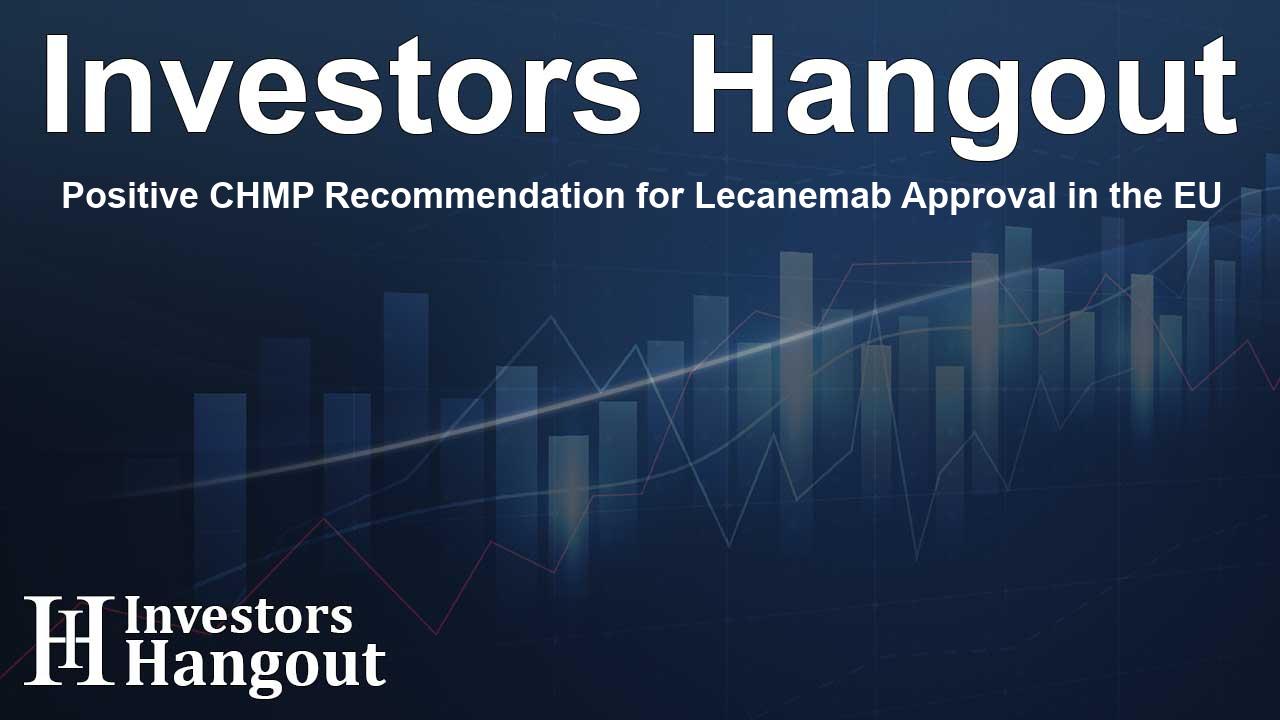Positive CHMP Recommendation for Lecanemab Approval in the EU

CHMP Issues Favorable Recommendation for Lecanemab
BioArctic AB (publ) has received exciting news regarding its partner Eisai's marketing authorization application for lecanemab, a groundbreaking treatment for Alzheimer's disease. The European Medicines Agency's (EMA) Committee for Medicinal Products for Human Use (CHMP) has issued a positive recommendation, indicating that lecanemab is safe and effective for treating early-onset Alzheimer’s disease in specific patient populations.
Understanding the Next Steps in Approval
The CHMP's recommendation is a significant milestone that will now move to the European Commission for final approval. This decision is expected within a short timeframe of about 67 days, which is essential for patients who could benefit from this innovative therapy.
Lecanemab has been designed to treat adult patients diagnosed with mild cognitive impairment and mild dementia stemming from Alzheimer's disease, particularly those with the apolipoprotein E ?4 (ApoE ?4) gene variations. This is a noteworthy step forward in addressing the urgent healthcare needs of this patient demographic.
The Significance of the CHMP Recommendation
Gunilla Osswald, the CEO of BioArctic, expressed gratitude towards CHMP for acknowledging the positive risk-benefit ratio of lecanemab for affected patients. This decision marks a step closer to making this necessary treatment available to those in Europe who are grappling with the challenges of early Alzheimer's disease.
Lecanemab's Global Approval Landscape
Lecanemab has already gained approval in numerous countries, including the United States, Japan, China, South Korea, and several others. This broad recognition underscores the potential of lecanemab to address Alzheimer's disease across various regions and serve as a linchpin in treatment planning for clinicians and patients alike.
Collaboration Between BioArctic and Eisai
Eisai has taken the lead on clinical development and market application for lecanemab, with BioArctic handling rights in the Nordic markets. This collaborative synergy is crucial as both companies prepare for a joint commercialization effort pending the expected approval from the European Commission.
About Lecanemab
Developed as part of the expansive research partnership between BioArctic and Eisai, lecanemab is a humanized IgG1 monoclonal antibody targeting amyloid-beta proteins. Its mechanism serves as an effective response to aggregates thought to be detrimental in Alzheimer's pathology.
The approval process has been supported by robust Phase 3 clinical trial data from Eisai's Clarity AD study. This essential research demonstrated that lecanemab significantly reduced cognitive decline compared to placebo, solidifying its role as an important treatment option.
Clinical Trial Outcomes and Data
In this pivotal study involving 1,795 patients, results indicated a notable reduction in clinical decline by 33% at the 18-month mark when compared with the placebo group. Such statistical significance showcases the capability of lecanemab to provide meaningful benefits to patients in the pivotal early stages of Alzheimer’s disease.
Future Directions for Treatment
The clinical journey of lecanemab continues with ongoing studies exploring its effectiveness in various stages of Alzheimer’s disease and its combination with other therapeutic approaches. The partnership with Eisai allows BioArctic to remain at the forefront of innovative solutions aimed at tackling this neurologically degenerative disease.
About BioArctic AB
BioArctic AB is a dedicated Swedish biopharmaceutical company focused on groundbreaking treatments that can slow down or stop neurodegenerative diseases. Their flagship product, lecanemab (marketed as Leqembi), stands as a pivotal development in the field of Alzheimer's disease, showcasing the company's commitment to research and innovation.
Frequently Asked Questions
What is the significance of the CHMP's recommendation for BioArctic?
The CHMP’s recommendation is crucial as it paves the way for lecanemab's approval in the European Union, potentially providing new treatment options for Alzheimer’s disease patients.
How does lecanemab work?
Lecanemab is a monoclonal antibody that targets amyloid-beta proteins, which are implicated in Alzheimer's disease, thereby aiming to reduce cognitive decline.
What are the expected next steps after the recommendation?
The next step involves awaiting a decision from the European Commission regarding the formal approval of lecanemab for patient use.
In which countries is lecanemab already approved?
Lecanemab is currently approved in multiple nations, including the United States, Japan, and several others worldwide, reflecting its broad acceptance in the treatment landscape.
What ongoing studies are related to lecanemab?
Ongoing studies include those assessing lecanemab’s efficacy in different stages of Alzheimer’s disease and exploring combinations with other treatments for enhanced outcomes.
About Investors Hangout
Investors Hangout is a leading online stock forum for financial discussion and learning, offering a wide range of free tools and resources. It draws in traders of all levels, who exchange market knowledge, investigate trading tactics, and keep an eye on industry developments in real time. Featuring financial articles, stock message boards, quotes, charts, company profiles, and live news updates. Through cooperative learning and a wealth of informational resources, it helps users from novices creating their first portfolios to experts honing their techniques. Join Investors Hangout today: https://investorshangout.com/
Disclaimer: The content of this article is solely for general informational purposes only; it does not represent legal, financial, or investment advice. Investors Hangout does not offer financial advice; the author is not a licensed financial advisor. Consult a qualified advisor before making any financial or investment decisions based on this article. The author's interpretation of publicly available data shapes the opinions presented here; as a result, they should not be taken as advice to purchase, sell, or hold any securities mentioned or any other investments. The author does not guarantee the accuracy, completeness, or timeliness of any material, providing it "as is." Information and market conditions may change; past performance is not indicative of future outcomes. If any of the material offered here is inaccurate, please contact us for corrections.